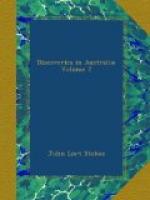(Footnote. The following is the Report of the Committee of the Legislative Council of New South Wales, on lighthouses proposed to be erected in Bass Strait: Your Committee have the honour to report, that having been favoured with the attendance of Captain Stokes, of her Majesty’s ship Beagle, lately returned from a survey of Bass Strait, and ascertained his ideas as to the best position for placing a lighthouse at the western entrance thereof, they are induced to change their opinion as set forth in their Report of the 1st September, 1841, and to coincide with him in thinking that Cape Otway would be a better site for a lighthouse than King Island, as being equally advantageous to the trade at large, and much more so to that of Port Phillip.
It would appear, too, that no danger could accrue to vessels endeavouring to make the former, while much mischief might arise in trying to sight the latter, should there be any error in their reckoning; and that it is therefore desirable to keep them as far as possible to the northward of King Island, instead of inducing them to risk the danger of approaching it, to ascertain their true position.
Captain Stokes perfectly coincides with the Committee, in the opinion formerly expressed by them, that the eastern island of Kent Group, is the best position for a light at the eastern entrance of Bass Strait; and they beg leave respectfully to recommend to your Excellency and honourable Council, that immediate steps may be taken for commencing so desirable an undertaking as the erection of a lighthouse on that spot.
(Signed) J. GIBBES, Chairman. Council Chamber, 6th September, 1842.)
In another part of this work I have adverted to the desirability of forming other convict establishments than those at present existing, particularly on the north-west and north-east coasts; and I would especially recommend the neighbourhood of Hanover Bay on the former, and Halifax Bay on the latter.* By these means many hitherto untrodden lands may speedily be adapted to the purposes of colonization, and reclaimed from their present unprofitable state. In a country like Australia, where the proportion of bad land predominates, it is almost necessary, in the first instance, to force settlements by means of convict labour. A number of buildings is always a cheering sight to a settler on his first arrival, and gives him encouragement to exertion; whereas, if the country wears its natural arid, desolate, uninviting appearance, dejection and despondency ensue.




